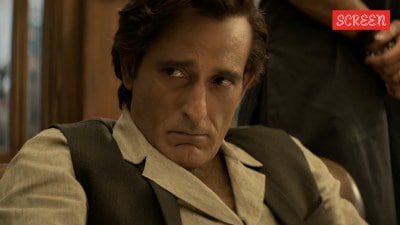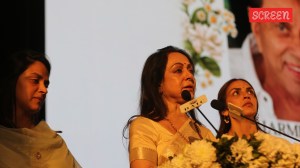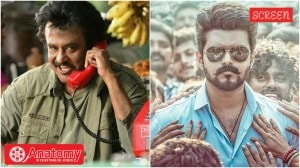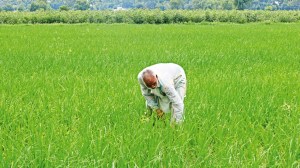Af Packs a Punch
Kabul Disco Nicolas Wild HarperCollins India Pages: 145 Rs 325
Early on in Nicolas Wilds Kabul Disco,a scene has his character sharing a table with grizzled war correspondents and aid agency veterans en route to Afghanistan. The others are soon swapping stories of atrocities they witnessed in hellholes across the world. They turn to Wild,who confidently says,No way,war-torn countries arent my thing. Wild,at that time a 28-year-old,Paris-based graphic artist,was embarking on a two-month sojourn in Kabul to write a comic explaining the Afghan constitution to the largely illiterate population. Eventually,he would spend more than two years in the city,at the end of which war-torn countries would definitely be his thing.
Kabul Disco: How I Did Not Get Kidnapped by the Taliban is the product of his experiences,first published in French. It was translated into English for publication in Kabuls expatriate magazine Afghan Scene. The magazine itself offers a glimpse into a surreal world tailors advertising skills in customised flak jackets,fortified complexes up for rent,traffic advisories warning of roads where kidnappings are common and Page 3 photos of party scenes.
This is the world Wild stepped into from the comfort of the Parisian suburb of Menilmontant in 2005. At that time,Afghanistan seemed to be on the slow road to recovery. The insurgency in Iraq was in full swing and Afghanistan had slipped below the radar it was thought that what remained were the dying remnants of the Taliban rather than the beginnings of a new cycle of violence. Wilds quixotic brief was to write comics explaining the workings of the newly drafted Afghan constitution to children. With illiteracy level nearing 85 per cent,comic was considered the best way to reach kids. Kabul Disco is essentially a snapshot of Wilds life there for six months. Visually,he is part of a long French tradition of black-and-white style,stretching from Jacques Tardi to David B and encompassing contemporary talents such as Marjane Satrapi. In the themes he chooses to engage,one can also mention Guy Delisle,a French-speaking writer who has won acclaim for his travelogues set in similar forbidding landscapes like Pyongyang and Yangon.
If you are expecting a detailed study of Afghanistan or its contemporary life in Kabul Disco,you will be disappointed. The ever-tightening security regulations only mean that Wild has to commute in an armed convoy and live in heavily guarded expatriate quarters. Thankfully,this is where Wilds talent shines through. Kabul Disco is as much a primer on office politics as it is about life in a besieged city. Wild has a sure touch for interpersonal dynamics,and Sayara Media,the company he works for,with its eclectic mix of employees,is superbly rendered. With a few deft strokes,he establishes characters,imbuing them with little verbal and visual tics. However,Wilds strength in capturing office politics and the claustrophobic world they operate in also means that Kabul Disco could be set anywhere.
What propels the narrative is the dry humour that Wild packs his frames with the first time he is given the constitution to read,he burns it for warmth. As the Taliban slowly begin to make their presence felt and the security situation in Afghanistan deteriorates,Wild and his co-expatriates are increasingly confined to their quarters,leavened only by their hedonistic parties the title comes from a CD compilation for such dos. Wild weaves in plenty of interesting tidbits did you,for instance,know the UN has its own airlines?
While visually cute,featuring as it does a cigarette-smoking constitution that giggles as it is written on,Kabul Disco falls flat on its face as a piece of coherent history. The novels weakness is perhaps in setting the context in which all these events take place. The US involvement,including the creation of the mujahiddeen which directly led to Osama amp; Co,is elided out of the narrative. And despite Wild coming from France,with its romantic belief in the Resistance,he is unable to gain an insight into why the foreign presence is so hated in Afghanistan.
Of course,Wilds misgivings grow as he realises how much Sayara and by extension he himself is embedded in the occupations security architecture. From making comics for Afghan kids to generating posters for the Afghan army is but a small step. Wild is not afraid of painting a very unflattering picture of himself as he acquiesces meekly after a token resignation letter. Ultimately,it is this honesty that carries the novel. The sharpest satire is reserved for the electoral process. The ballot ensures that even illiterate voters can exercise their franchise by associating each candidate with a symbol. Unfortunately,the symbols are assigned randomly and Wild has great fun with bizarrely inappropriate symbols when taking into account the candidates they represent. There is a brilliant sequence involving posters who begin talking among themselves. Wild sardonically ends with Afghans! Rebuild your country by electing those who destroyed it! The farce that surrounded Hamid Karzais reelection recently only underscores how little things have changed.
- 01
- 02
- 03
- 04
- 05































